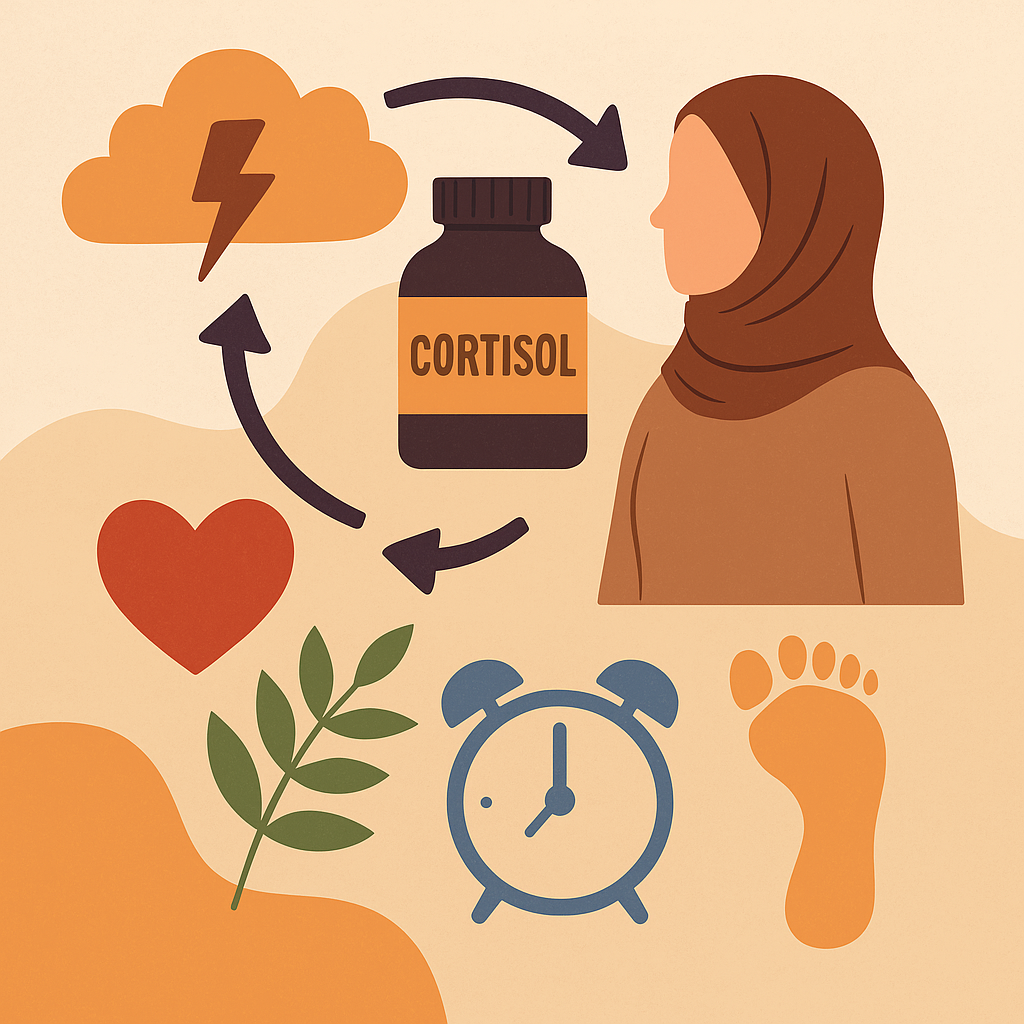
The Cortisol Connection: How to Manage Stress to Tackle Stubborn Belly Fat
You’re doing all the right things. You’re eating clean, you’re exercising, and you’re avoiding junk food. Yet, that stubborn fat around your middle just won’t shift. It’s a frustrating cycle that can make you feel like you’re failing, but the answer might not lie in another diet or a more intense workout.
The hidden culprit could be a hormone you’ve likely heard of: cortisol. Understanding and managing this powerful stress hormone is often the missing piece of the puzzle for tackling stubborn belly fat and improving your overall health.
What Exactly Is Cortisol?
Cortisol isn’t inherently bad. Produced by your adrenal glands, it’s your body’s primary stress hormone, best known for fuelling your "fight or flight" response. When you face an immediate threat, cortisol floods your system, releasing glucose (sugar) into your bloodstream to give your muscles a burst of energy.
In short-term, acute situations, this is a brilliant survival mechanism. The problem arises when the stress doesn't go away. In our modern world, we’re not running from predators; we’re dealing with chronic, low-grade stressors: work deadlines, traffic, financial worries, and constant digital notifications. This keeps our cortisol levels persistently high.
The Vicious Cycle of Stress and Fat Storage
When cortisol is chronically elevated, it creates a cascade of effects that specifically encourage fat storage around the abdomen, also known as visceral fat.
-
Increased Blood Sugar: High cortisol constantly tells your liver to release sugar into the blood. Your body thinks it needs energy to fight a threat that never comes.
-
Spiked Insulin: To manage this excess blood sugar, your pancreas releases insulin. Insulin’s job is to move sugar out of the blood and into cells.
-
Fat Storage Signal: Insulin is also a powerful fat-storage hormone. When both cortisol and insulin are high, it’s a potent signal for your body to store any unused energy as fat, particularly in the belly area.
-
Cravings for Comfort Food: To make matters worse, high cortisol levels are linked to intense cravings for high-sugar, high-fat foods. This provides a quick energy hit that your stressed-out body thinks it needs, creating a self-sabotaging cycle.
How to Lower Cortisol and Break the Cycle
Tackling cortisol-driven belly fat isn't about working harder; it’s about working smarter and more holistically. The focus must shift from punishing exercise and restrictive diets to deep nourishment and stress regulation.
Prioritise Deep Rest and Sleep
This is non-negotiable. Your body regulates cortisol levels overnight. A lack of quality sleep is a major physical stressor that sends cortisol soaring the next day.
✅ Aim for 7-9 hours of quality sleep per night.
✅ Create a relaxing wind-down routine away from screens. A warm bath, reading a book, or listening to quiet Quran recitation can be deeply calming.
Nourish Your Body with the Right Foods
Focus on balancing your blood sugar at every meal to prevent the insulin spikes that drive fat storage.
✅ Build your plate around Protein, Fat, and Fibre.
✅ Eat magnesium-rich foods like dark leafy greens, nuts, seeds, and dark chocolate. Magnesium has a calming effect on the nervous system.
✅ Incorporate Omega-3 fatty acids from oily fish, walnuts, and flaxseeds to help lower inflammation.
Move Your Body Mindfully
While exercise is a great stress reliever, too much high-intensity training can actually raise cortisol further, especially if you're already chronically stressed.
✅ Focus on restorative movement like walking in nature, yoga, and gentle stretching.
✅ Incorporate strength training 2-3 times a week. Building muscle improves insulin sensitivity, helping your body manage blood sugar better.
Actively Manage Your Stress
In Islam, we are taught to seek tranquility (sakinah) and to place our trust in Allah (tawakkul), which are powerful antidotes to chronic stress.
✅ Practice deep breathing: Just five minutes of slow, deep belly breathing can significantly lower cortisol.
✅ Connect with nature: Spending time outdoors is proven to reduce stress levels.
✅ Engage in regular prayer (salah) and remembrance (dhikr): These acts provide grounding, mindful moments that disconnect you from worldly stressors.
✅ Consider adaptogenic herbs: Herbs like Ashwagandha have been shown to help the body adapt to stress and regulate cortisol levels.
Breaking free from the cortisol-belly fat trap is about shifting your focus from the outside in, to the inside out. By nourishing your body, prioritising rest, and calming your nervous system, you address the root cause, allowing your body to finally feel safe enough to let go of that stubborn fat.



Leave a comment
This site is protected by hCaptcha and the hCaptcha Privacy Policy and Terms of Service apply.